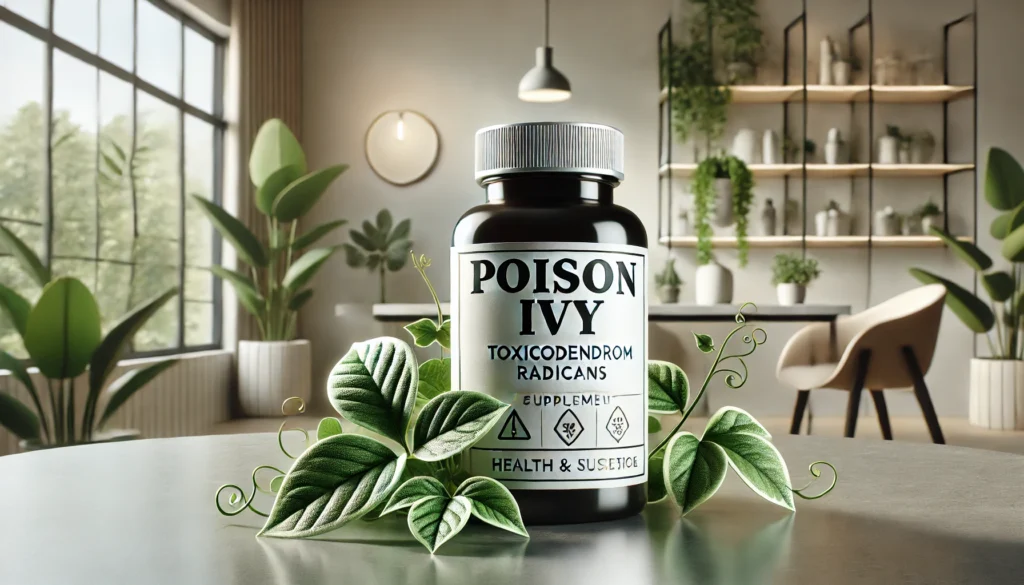Poison Ivy, known scientifically as Toxicodendron radicans, is often recognized for its skin-irritating properties due to its active compound, urushiol. Despite its notorious reputation, certain compounds found within Poison Ivy are being explored in research for potential therapeutic effects, including possible nootropic properties. This article delves into the composition, mechanisms, and speculative cognitive benefits of Poison Ivy, as well as detailed considerations for safe use, dosage, and interactions. Although its use as a nootropic supplement remains controversial, understanding its biochemical profile and the science behind its components provides valuable insights into its broader implications for cognitive health.
You May Also Like:
Poison Ivy: Potential Nootropic Benefits, Dosage, Side Effects, Interactions, and Other Important Information About This Supplement is an original (NootropicsPlanet) article.
Source of Poison Ivy Compounds
Poison Ivy is a perennial plant native to North America, often thriving in forests, fields, and urban areas. It belongs to the Anacardiaceae family, which includes other urushiol-producing plants like Poison Oak and Poison Sumac. The plant’s leaves, stems, and roots contain urushiol, an oily resin responsible for inducing an allergic reaction upon contact. Traditionally, Indigenous groups have used diluted extracts of Poison Ivy in small, controlled amounts for medicinal purposes, including skin ailments, and as an immune stimulant. However, its potential cognitive benefits, particularly through neurostimulatory and anti-inflammatory effects, are an area of growing interest within pharmacology and herbal medicine.
Ashwagandha aids in memory retention and learning—Support Mental Clarity, Buy Today on Amazon!

Chemistry of Poison Ivy Compounds
The primary active ingredient in Poison Ivy is urushiol, a mixture of alkyl catechols with varying side chain lengths that make it both lipophilic and allergenic. Urushiol binds to skin proteins, where it elicits a delayed hypersensitivity reaction in most individuals, leading to skin rashes and inflammation. Urushiol and related compounds exhibit a dual role in the body, acting as both an immune stimulant and a pro-inflammatory agent. Research suggests that when carefully extracted and purified, the alkyl catechols may influence cellular pathways involved in oxidative stress and inflammation.
In the context of cognitive health, catechols are known for their neuroactive potential due to their ability to modulate neurotransmitters like dopamine and norepinephrine. As a structurally similar catechol, urushiol could theoretically exert effects on neural cells, although research is limited, and further studies are necessary to understand this compound’s biochemical effects on the brain.
Physiological Mechanisms of Poison Ivy Compounds in the Body and Brain
When applied topically or ingested in microdoses, Poison Ivy’s catechols could potentially affect the body by engaging both immune cells and nervous system components. Its antioxidant properties, similar to other catechols, may allow it to scavenge free radicals, thus offering neuroprotection. Animal studies on catechol derivatives have shown they can protect neural cells from oxidative damage and regulate neuroinflammatory processes, two factors strongly associated with cognitive decline and neurological diseases. Additionally, catechols may influence the synthesis of dopamine, a neurotransmitter central to mood, focus, and motivation, by acting as dopamine agonists in select neural pathways.
Though studies are limited, this theoretical mechanism suggests that in controlled doses, Poison Ivy extracts might support cognitive clarity and mental focus through indirect neuroprotective actions. Given these speculative mechanisms, Poison Ivy’s role as a nootropic supplement remains largely unverified but theoretically promising.

Nootropic Benefits of Poison Ivy (Hypothetical)
The following cognitive benefits of Poison Ivy are purely hypothetical and are based on the potential neuroactive properties of catechol compounds. Clinical trials and human studies are necessary to substantiate these benefits, as they remain speculative.
- Enhanced Focus and Mental Clarity: Poison Ivy’s catechol derivatives may support mental clarity by modulating dopamine pathways in the brain, potentially enhancing focus and motivation. This dopamine-stimulating effect, common among catechols, is crucial for cognitive tasks that require sustained attention and concentration, especially under stress. With enhanced dopamine release, users might experience improved cognitive processing speed and mental endurance, enabling longer periods of focus. Additionally, this effect could aid in combating mental fatigue, a common barrier to effective cognitive performance.
- Neuroprotection and Antioxidant Support: The antioxidant properties of catechol structures may confer neuroprotective effects against oxidative damage, which contributes to cognitive decline. In theory, Poison Ivy’s alkyl catechols could protect neural cells from oxidative stress, particularly in high-metabolic areas of the brain, where free radical accumulation can lead to neurodegenerative diseases. By neutralizing free radicals, these compounds may promote brain health over time, supporting a clearer and sharper mind. Neuroprotective effects are especially valuable as they can slow down age-related cognitive impairments and preserve mental agility.
- Potential Mood Stabilization: Due to its indirect interaction with dopamine pathways, Poison Ivy may influence mood regulation. Studies of similar catechols show they could potentially stabilize mood by increasing dopamine levels, which may aid cognitive function by reducing anxiety and improving overall mental clarity. The positive impact on mood could further enhance cognitive performance by reducing stress-related distractions. This stabilization may also benefit individuals with mood fluctuations, as steady dopamine levels often correlate with more consistent emotional resilience.
- Anti-Inflammatory Effects on Neuroinflammation: Inflammation is a major contributor to cognitive decline, and catechol derivatives have shown anti-inflammatory effects in experimental models. While unverified, Poison Ivy’s compounds may help reduce neuroinflammation, theoretically aiding cognitive performance over the long term. Chronic neuroinflammation is linked to memory impairment and reduced cognitive flexibility, so mitigating inflammation could promote better memory retention. Additionally, reduced inflammation in the brain can improve mental clarity and prevent disruptions in normal cognitive processes.

Dosage and Supplementation Guidelines
Due to its highly allergenic nature, Poison Ivy is not available as a commercial supplement and dosing guidelines for cognitive benefits are speculative. Traditional uses of Poison Ivy in medicinal practices involved extreme dilution, often applied topically rather than ingested. No standardized nootropic dosage exists, but if isolated compounds from Poison Ivy were studied for cognitive benefits, they would likely require microgram or milligram dosing under strict medical supervision.
- General Dosage Caution: Poison Ivy should not be consumed or used without expert guidance. Most studies involving urushiol focus on its allergic response rather than its potential nootropic properties. If nootropic benefits were pursued, it would involve using minute concentrations of isolated catechol compounds, such as urushiol, to avoid toxic effects.
- Medical Supervision Required: Poison Ivy or urushiol-based compounds would require medical oversight due to the severe allergic reactions they can trigger. Any future use of Poison Ivy as a supplement would necessitate extensive purification and verification to ensure safety.
Side Effects and Safety
The use of Poison Ivy poses significant safety risks, as urushiol can cause severe allergic reactions, even in minute quantities. Symptoms include redness, itching, swelling, and blistering of the skin, which can extend to the respiratory tract if inhaled. Potential side effects of Poison Ivy, especially in any nootropic application, are severe and warrant strong caution.
- Severe Allergic Reaction: Exposure to urushiol causes allergic contact dermatitis in most people. This reaction can be severe, necessitating medical intervention in some cases. Any potential therapeutic use of urushiol would require modifications to reduce its allergenic properties.
- Digestive and Respiratory Risks: If ingested or inhaled, Poison Ivy can lead to gastrointestinal distress, respiratory inflammation, and, in extreme cases, anaphylaxis. Due to these risks, Poison Ivy is not suitable for use in any traditional supplement form.
- Cognitive Side Effects: Given its potential neuroactivity, urushiol could theoretically influence neurotransmitters. However, the potential for overstimulation or toxic effects on neurons has not been studied, unknown risks for cognitive health have been posed.
Unlock Brain Health and Mental Resilience with Advanced Bacopa Monnieri—Shop Now on Amazon!

Interactions with Other Supplements and Medications
Poison Ivy is known primarily for its irritant properties, and data on its interactions with other medications or supplements is limited. Any application of Poison Ivy in supplement form would require careful consideration of interactions due to its immune-stimulating effects.
- Anti-Inflammatory Drugs: As urushiol induces a strong inflammatory response, its use alongside anti-inflammatory drugs could result in counterproductive effects, where the body’s inflammatory pathways are simultaneously suppressed and activated.
- Immunosuppressants: Poison Ivy’s potential to stimulate immune response could interfere with immunosuppressive drugs, potentially diminishing their efficacy and increasing the risk of allergic reactions.
- Other Nootropics and Stimulants: Due to its hypothesized impact on dopamine pathways, Poison Ivy’s compounds could interact with nootropic agents that also affect dopamine levels, leading to overstimulation, mood swings, or heightened risk of neurotoxicity.
- Antihistamines: Using Poison Ivy alongside antihistamines could obscure allergic symptoms, potentially masking the severity of reactions and leading to delayed treatment.
Risks for Individuals with Certain Health Conditions
Certain populations face heightened risks when exposed to Poison Ivy or urushiol compounds, especially those with pre-existing health conditions.
- Allergy-Prone Individuals: People with known allergies, particularly contact dermatitis, should avoid Poison Ivy due to the high likelihood of cross-reactivity.
- Respiratory Disorders: Individuals with asthma or respiratory issues may experience exacerbated symptoms if exposed to urushiol fumes, potentially leading to bronchial inflammation or asthma attacks.
- Immune Disorders: Poison Ivy’s potential immune-modulating effects make it unsuitable for individuals with autoimmune conditions, as it could either intensify immune responses or interfere with immune regulation.
- Pregnant or Breastfeeding Women: Due to its unknown effects on fetal and infant development, Poison Ivy should not be used by pregnant or breastfeeding women under any circumstances.
Is Poison Ivy a Viable Nootropic Supplement?
While Poison Ivy contains intriguing compounds with potential neuroactive effects, its severe allergenic properties make it an impractical choice for nootropic use. The plant’s main active ingredient, urushiol, is known more for its inflammatory potential than its cognitive benefits. Hypothetical applications of Poison Ivy for cognitive enhancement would require extensive research, purification, and modification to render its compounds safe for use in humans.
Although catechol compounds found in Poison Ivy could offer neuroprotective and cognitive benefits theoretically, its well-documented toxicity currently outweighs these potential benefits. Given the lack of clinical evidence and the high risk of adverse reactions, Poison Ivy remains unsuitable for safe consumption as a nootropic. Alternative nootropics with established safety profiles and clearer cognitive benefits should be prioritized in any cognitive health regimen.

References:
- Poison Ivy – Uses, Side Effects, and More. Retrieved from: https://www.webmd.com/vitamins/ai/ingredientmono-468/poison-ivy
- Catechol inhibits epidermal growth factor-induced epithelial-to-mesenchymal transition and stem cell-like properties in hepatocellular carcinoma cells. Retrieved from: https://www.nature.com/articles/s41598-020-64603-2
- Catechol enhances chemo‑ and radio‑sensitivity by targeting AMPK/Hippo signaling in pancreatic cancer cells. Retrieved from: https://www.spandidos-publications.com/10.3892/or.2021.7924
Important Note: The information contained in this article is for general informational purposes only, and should not be construed as health or medical advice, nor is it intended to diagnose, prevent, treat, or cure any disease or health condition. Before embarking on any diet, fitness regimen, or program of nutritional supplementation, it is advisable to consult your healthcare professional in order to determine its safety and probable efficacy in terms of your individual state of health.
Regarding Nutritional Supplements Or Other Non-Prescription Health Products: If any nutritional supplements or other non-prescription health products are mentioned in the foregoing article, any claims or statements made about them have not been evaluated by the U.S. Food and Drug Administration, and such nutritional supplements or other health products are not intended to diagnose, treat, cure, or prevent any disease.


